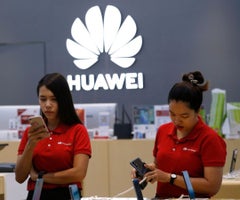MI SELECCIÓN DE NOTICIAS
Noticias personalizadas, de acuerdo a sus temas de interés

Chinese tech giant plans to launch its own operating system this year as access to U.S. software is hit by export ban
Huawei Technologies Co. is pinning its hopes on a self-designed operating system to replace Google’s Android following a U.S. blacklisting. The question is: Can it succeed where others have failed?
Huawei last week was granted a trademark, “Hongmeng,” for the operating system by the trademark office of China’s National Intellectual Property Administration. The company has been working on the system under the code name “Project Z” as an insurance policy in case it lost access to American technology like Android, which powers Huawei’s popular smartphones, and hopes to release it later this year.
That scenario happened when Google was forced to cut off access to software after the U.S. Commerce Department placed Huawei on its “entity list,” banning the transfer of U.S. technology to the Chinese company without a license, on the grounds of national security.
Persuading users to switch operating systems is notoriously difficult. Several tech companies including Samsung Electronics Co. and Microsoft Corp. have built homemade alternatives to Android but they never caught on with smartphone users. The market is effectively a duopoly, with Android running on 87% of smartphones sold in the first quarter, and Apple’s iOS running on almost all of the rest, according to market research firm Canalys.
“You’re providing the consumer with a brand new ecosystem-brand new very basic apps, and you need to persuade them to try them,” said Mo Jia, an analyst at Canalys. “It’s quite hard for Huawei, to be honest.”
Huawei’s operations face damage from the U.S.’s export ban, despite investing heavily in recent years to develop its own components and software to reduce its reliance on the U.S. Other Chinese tech manufacturers are even more reliant on U.S. suppliers, making the disruption of supplies such as chips and operating systems a weapon in the broader trade fight between Washington and Beijing.
Details about Huawei’s new operating system beyond the trademarked name remain scant. Hongmeng won’t necessarily be the operating system’s final name, according to a person familiar with the matter.
Within Huawei, fostering a new ecosystem of widely used apps to go with the operating system will be the biggest challenge and it would take at least two to three years, according to a person familiar with the matter. Consumers outside of China, who are used to using Google’s suite of apps, are less likely to make the switch than Chinese users, Mr. Jia said. A Google spokesman declined to comment.
Richard Yu, the head of Huawei’s consumer business, said in an interview with CNBC on May 22 that the company’s operating system could be ready for use in China by the end of the year, and for international markets early next year. A Huawei spokesman confirmed the remarks.
Android is an open-source software, meaning Huawei can continue using the public version of the operating system on its phones. But future phone models won’t be able to license popular Google apps like Gmail, Google Maps and Play, and Google will lose the ability to provide security and software updates for users beyond a 90-day reprieve announced by the Commerce Department this week.
The loss of Android is a blow to Huawei’s wildly successful smartphone business. Worldwide shipments rose 50% in the first quarter, bucking a broader market slump, outselling Apple Inc., and trailing only Samsung, according to IDC. Revenue for Huawei’s consumer business-which sells laptops, smartwatches and other gadgets-grew 45% last year and is now the company’s largest single business division.
U.S. consumers aren’t likely to be familiar with Huawei devices. No major carriers sell its handsets in the U.S., and Huawei’s broader business of telecom networking equipment has been effectively blocked from competing in the U.S. beyond rural markets since a 2012 Congressional report branded it a security threat. Huawei has long denied that it is a threat. Europe and China are instead its biggest markets.
Smartphone makers have had limited success in getting consumers to switch operating systems in the past. Samsung launched a rival operating system several years ago dubbed “Tizen,” but it failed to gain traction among smartphone users. A bid by Microsoft to sell smartphones with a version of its Windows operating system also fared poorly.
By Yang Jie, Dan Strumpf
La preocupación por el cierre de la mina perjudicó el valor de los bonos y ha causado que los operadores traten la deuda del país como un crédito con grado especulativo
La empresa minera británica posee minas en países como Chile, Sudáfrica, Brasil y Australia y tiene una capitalización bursátil de US$36.710 millones
Una adquisición exitosa representaría el primer mega acuerdo entre las mineras diversificadas más grandes del mundo en más de una década